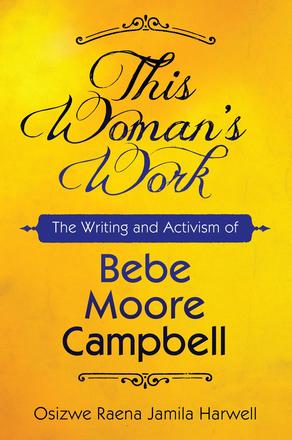
This Woman's Work
The Writing and Activism of Bebe Moore Campbell
In This Woman's Work, Osizwe Raena Jamila Harwell provides readers with the first full-length study of the work of Bebe Moore Campbell, the prolific, immensely popular, and politically-engaged writer whose career was cut short by her untimely death a decade ago. Through her insightful textual analyses and her careful theorizing of black feminist activism, Harwell brilliantly shows the subtle yet forceful ways Campbell's deeply felt convictions found expression in her fiction. This Woman's Work will prompt scholars and general readers alike to explore or revisit Campbell's extraordinary body of work and to consider the complex relationship between politics and cultural production.
Description
This Woman's Work presents a social history and critical biography based on the life of award-winning writer Bebe Moore Campbell (1950-2006). It offers the personal story of a popular novelist, journalist, and mental health advocate. This book examines Campbell's life and activism in two periods: first, as a student at the University of Pittsburgh during the 1960s black student movement and, second, as a mental health advocate near the end of her life in 2006. It describes Campbell's activism within the Black Action Society from 1967 to 1971 and her negotiation of the Black Nationalist ideologies espoused during the 1960s. The book also explores Campbell's later involvement in the National Alliance on Mental Illness (NAMI), her role as a national spokesperson, and the local activism that sparked the birth of the NAMI Urban-Los Angeles chapter, which served black and Latino communities (1999-2006).
Adjacent to her activist work, Campbell's first novel, Your Blues Ain't Like Mine, connects to her emerging political consciousness (related to race and gender) and the concern for racial violence during the US black liberation period from 1950 to 1970. Similarly Campbell's final novel, 72 Hour Hold, is examined closely for its connection to her activism as well as the sociopolitical commentary, emphasis on mental health disparities, coping with mental illness, and advocacy in black communities. As a writer and activist, Campbell immersed her readers in immediately relevant historical and sociopolitical matters. This Woman's Work is the first full-length biography of Bebe Moore Campbell and details the seamless marriage of her fiction writing and community activism.
Reviews
In This Woman's Work, Osizwe Raena Jamila Harwell provides readers with the first full-length study of the work of Bebe Moore Campbell, the prolific, immensely popular, and politically-engaged writer whose career was cut short by her untimely death a decade ago. Through her insightful textual analyses and her careful theorizing of black feminist activism, Harwell brilliantly shows the subtle yet forceful ways Campbell's deeply felt convictions found expression in her fiction. This Woman's Work will prompt scholars and general readers alike to explore or revisit Campbell's extraordinary body of work and to consider the complex relationship between politics and cultural production.
- Valerie Smith, president of Swarthmore College, author of Toni Morrison: Writing the Moral Imagination, and coeditor (with Adrienne Brown) of Race and Real Estate
Bravo to Osizwe Harwell for elevating the status of Bebe Moore Campbell to her rightful place as an icon of contemporary womanist and black feminist literary genius and activism! Campbell's exemplification of writing-as-activism and writing-as-healing have contributed to the survival and thriving of many, and Harwell has brilliantly elucidated the political and psychological value of Campbell's multi-level engagement with 'everyday folk. ' Because of Harwell's scholarship on Campbell, we can now advance the cause of mental health activism as social justice activism with greater authority and sensitivity, at the same time as we uplift those authors whose gift is to transform the lives of diverse readerships through sophisticated yet relatable storytelling.
- Layli Maparyan, Katherine Stone Kaufmann '67 Executive Director of the Wellesley Centers for Women at Wellesley College and author of The Womanist Reader and The Womanist Idea